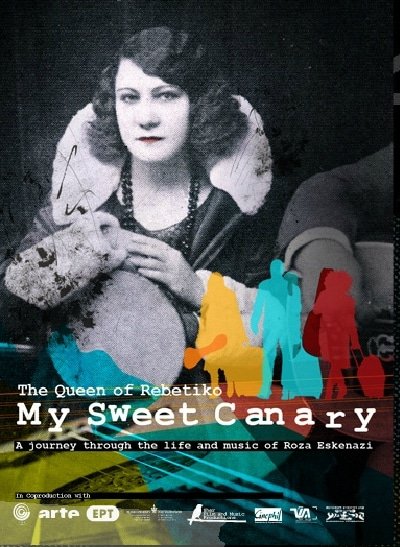
Roza Eskenazi sang songs and lived life with passion, fire and love.This is the story of three young musicians from Greece, Turkey and Israel that embark on an exciting musical journey, to reveal for the first time, the story of the first and most famous Greek Rebetiko singer.From Istanbul to Thessaloniki and Athens, through her life and music, we will introduce a world that has once existed and its traces today.
She was the most famous singer of the 30s’ in Greece and Turkey, the Diva of Rebetiko. With her posters displayed in every Gramophone store, her bohemian looks would drive even the toughest men crazy. (From the short story ‘Roza’, by Dinos Christianopoulos)
In a colorful and full of life cinematic and musical journey, the film ‘My Sweet Canary’, will follow three young musicians from Israel, Turkey and Greece, on a journey motivated by the influence of Roza Eskenazi’s life, as an artist and as a woman, an influence that drew each one of them, for his own reasons, to play her music in his native country today.
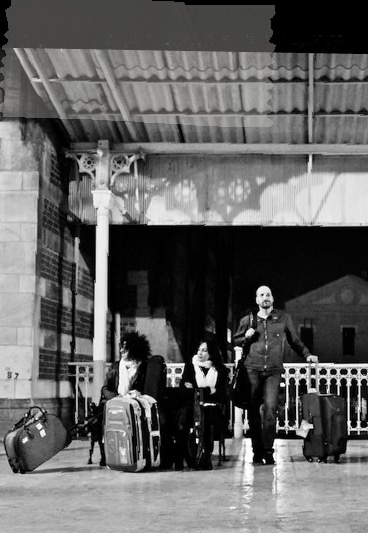 Tomer Katz, an Israeli Oud and bouzouki player; Martha D Lewis, a British born Greek-Cypriot singer/composer and Mehtap Demir, a Turkish singer and musician, will lead us throughout Roza’s life story over the 20th century, a story that intertwines with their musical journey throughout today’s exotic Rebetiko scenes of Turkey and Greece, playing and meeting with local musicians and giving new interpretations to Roza’s borderless songs revived today in bars and dance floors in Athens, Istanbul, Thessaloniki and around the world.
Tomer Katz, an Israeli Oud and bouzouki player; Martha D Lewis, a British born Greek-Cypriot singer/composer and Mehtap Demir, a Turkish singer and musician, will lead us throughout Roza’s life story over the 20th century, a story that intertwines with their musical journey throughout today’s exotic Rebetiko scenes of Turkey and Greece, playing and meeting with local musicians and giving new interpretations to Roza’s borderless songs revived today in bars and dance floors in Athens, Istanbul, Thessaloniki and around the world.
Roza’s personal story, spread from her Jewish Sephardic origin in Istanbul and Thessaloniki, and on to Athens where she rose to fame at the end of the 20’s, becoming the first and most recorded Rebetiko singer with more than 500 recorded songs in Greek, Turkish, Armenian and Ladino- and up to the tragic end of her life, will be told by her friends, family members, the musicians who followed her and, for the first time, her biographer.
The Rebetiko music lies in the meeting point of the east and the west. The «Greek Blues» as it is often referred to, emerged from the hash dens and prison cells of Greece at the beginning of the 20th century. Documenting the 3 musicians through their cultural, geographical and musical journey, the film will reveal the social and political aspects of the Rebetiko phenomena as well.
Through the life story of Roza Eskenazi, we will introduce a world that once existed and follow its traces today, as well as the mutual and personal search of the three musicians that joined together in a bond made possible by Roza Eskenazi, and the Rebetiko music.
– – – – – – – – – – – – – – – – – – – – – – – – – – – – – – – – – – – – – – – – – – – – – – – – – – – – – – – – – – – – – – – – – – – – – – – – – – – – – –
Roza Eskenazi (mid-1890s – 2 December 1980, Greek: ???? ????????) was a famous Greek singer of Rebetiko and traditional Greek music, whose recording and stage career extended from the late 1920s into the 1970s.
………………. Childhood …………………
Eskenazi was born Sarah Skinazi to an impoverished Sephardic Jewish family in Istanbul. Throughout her career she hid her real date of birth, and claimed to have been born in 1910.
In fact, she was at least a decade older, and was likely born sometime between 1895 and 1897. Her father, Avram Skinazi, was a rag dealer. In addition to Roza, he and his wife Flora had two sons, Nisim, the eldest, and Sami.

Shortly after the turn of the century, Skinazi family relocated to Thessaloniki, then still under Ottoman rule. The city was undergoing rapid economic expansion at the time, with its population growing by 70 percent between 1870 and 1917. Avram Skinazi found work in a cotton processing mill and took various odd jobs to improve his family’s financial standing.
At the time, he entrusted young Sarah to a neighboring girl, who tutored several local children in basic reading and writing. These sessions were the extent of her formal education.
For some time, Sarah, her brother, and her mother lived in nearby Komotini, a city that at that time, still had a sizable Turkish-speaking population. Roza’s mother found employment there as the live-in maid for a wealthy family, and Roza assisted her with the housework.
One day, Sarah was overheard singing by the Turkish owners of a local tavern. They were enthralled by her voice, and immediately came to the door to express their wish to hire the girl to perform in their club. Sarah’s mother was incensed at the suggestion that her daughter—or any other member of her family—would become an artiste. Years later, in an interview, Roza admitted that her time in Komotini was a turning point in her life. It was there, she said, that decided to become a singer and dancer.
…………….. Early career ……………….
Sarah was not to realize this dream until her return to Thessaloniki. At the time, the family was renting an apartment near the city’s Grand Hotel Theater, and several of the neighbors performed there. Every day, Sarah would help two of the dancers carry their costumes to the theater, hoping that she would one day appear on the stage alongside them. It was there that she finally began her career as a dancer.
While still a teenager, Sarah Skinazi fell in love with Yiannis Zardinidis, a wealthy man from one of Cappadocia’s most prominent families.
Zardinidis’s family disapproved of the match, considering her to be of loose moral character.Nevertheless, the two of them eloped around 1913, and Sarah changed her name to Roza, the name by which she was known throughout her career.
Zardinidis died, due to unknown circumstances, around 1917, leaving Roza with a little child-Paraschos. Realizing that she could not maintain her career as a performer while raising an infant, she brought him to the St. Taksiarchis nursery in the city of Xanthi. His father’s family agreed to support him there, and Paraschos Zardinidis eventually grew up to be a high ranking officer in the Greek Air Force. It was only years later that he finally reunited with his mother, after finding her in Athens in 1935.
………………… Athens …………………..
Roza had moved to Athens shortly after Zardinidis’s death to pursue her musical career.She quickly teamed up with two Armenian cabaret artists, Seramous and Zabel, who reportedly liked her because she could speak Turkish, and because she showed talent as a singer. Though she continued to perform as a dancer, Roza also began to sing for patrons of the club in Greek, Turkish, and Armenian. It was there that she was first “discovered” by well-known composer and impresario Panagiotis Tountas in the late 1920s. Tountas immediately recognized her talent and introduced her to Vasilis Toumbakaris of Columbia Records.
Roza’s first two recordings for Columbia, Mandili Kalamatiano and Koftin Eleni Tin Elia (c. 1928) marked the beginning of a recording career that would continue almost without interruption well into the 1960s. By the mid-1930s, she had recorded over 300 songs for them, and had become one of their most popular stars. Some of the music was folk songs, especially from Greece and ?zmir in Turkey. Her most important contribution to the local music scene, however, was her recordings of Rebetiko and especially the Smyrna school of Rebetiko. She was, almost single-handedly, behind the music’s breakthrough into popular culture, and even today her unique sound is still identified with the genre.
Soon after she began recording, Roza began performing nightly at the Taygetos nightclub in Athens as well. Appearing with her on stage were Toundas, the violinist Salonikios, and oud player Agapios Tomboulis. Eskenazi, however was the star of the show, earning an unprecedented 200 drachmas per night. She later confided to her biographer Kostas. Hatzidoulis that she should have been much wealthier, just from the income of the show, but that she had a weakness for expensive jewelry and spent too much of her income on it.
As her career blossomed, Eskenazi signed an exclusive contract with Columbia Records, sometime in 1931 or 1932. According to the terms of her contract, she would record at least 40 songs per year and receive 5 percent of the cost of every one of her records that she sold. At the time, she was the only female Greek artist to have a royalties agreement with a record companies.
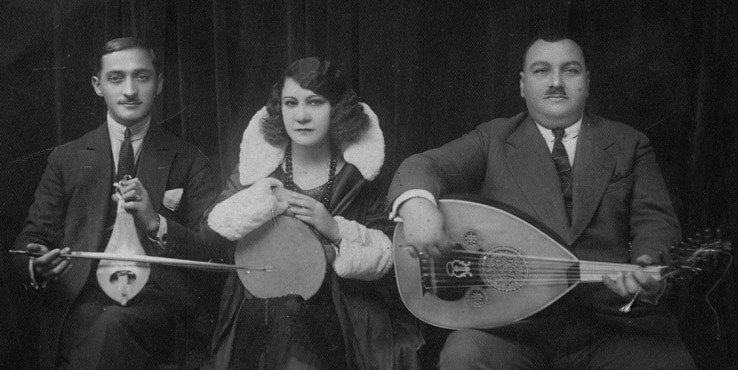
Before long, her career extended beyond the political boundaries of Greece to the Greek Diaspora. Together with Tomboulis, she traveled to Egypt, Albania, and Serbia, receiving a warm reception not only from the local Greek communities, but from the Turkish communities as well.
Her music had a certain edginess to it, and one of her songs, When You Take Cocaine”, was even censored by Greek strongman Ioannis Metaxas. As a result of his decision, many other traditional rebetiko artists were marginalized, though a new trends in the genre, led by Vassilis Tsitsanis, gained ground.
……………… World War II ……………..
Within a short time, however, Greece’s own independence would be challenged. By 1940, Italy invaded, and in 1941 the German army occupied the country. Despite the repressive regime, Roza continued performing, and in 1942, she even opened up her own nightclub, Krystal, together with her son Paraschos, with whom she had since been reunited. Although she was a Jew, she had managed to obtain a fake baptismal certificate, though her safety was also ensured by an affair she had with a German officer.
But Roza Eskenazi was hardly a traitor or even a collaborator. She used her privileged position to support the local resistance, and hid resistance fighters and even English agents in her home. She was also able to rescue Jews in both Athens and Thessaloniki. Among those she saved from deportation to Auschwitz was her own family. By 1943, her cover finally crumbled, and Eskenazi was arrested. She spent three months in jail before a concerted effort by her German lover and her son succeeded in getting her released. She spent the rest of the war in hiding, fearful that she might be arrested again.

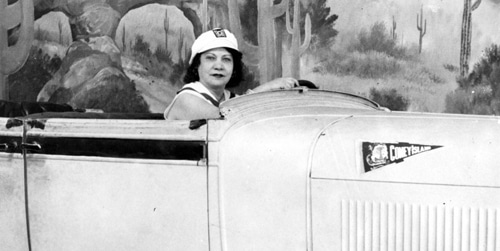
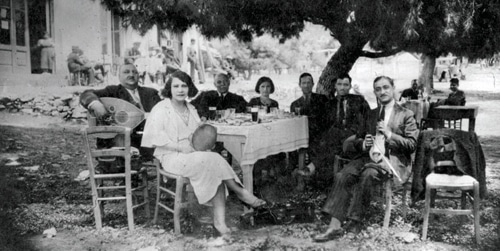
…………… The post-war years …………..
Over the course of her long career, Roza developed good relations not only with Columbia Record’s Vasilis Toumbakaris, but also with Minus Matsas, who had recently founded Odeon/Parlophone. This enabled her to promote the careers of many other well-known artists, including Marika Ninou and Stella Hazkil. She introduced them to the ‘I Aliliovoithia’ musicians union, and within a short time, they were recording with Vassilis Tsitsanis.
After the war, in 1949, Roza returned to Patras to obtain a new ID card. She gave a few concerts as well, but the real turning point in her life came when she met Christo Philipakopoulos, a young police officer almost thirty years her junior. Despite the age gap, the two of them fell in love. It was a relationship that would last, in some form or other, for the rest of Roza’s life.
Although Roza had toured extensively throughout the Balkans, it was only in 1952 that she made her first tour of the United States to perform for the Greek and Turkish Diasporas there. The trip was sponsored by the Parthenon Restaurant and Bar in New York City and lasted several months.
This was just the first of several musical tours overseas. In 1955, Albanian impresario Ayden Leskoviku of the Balkan Record Company invited her to perform and record in Istanbul, the city where she was born. She eventually recorded about forty songs for Leskoviku, and received about $5,000 for them. Although this was a relatively paltry sum, she later claimed that her performance fees and tips were ten times that amount.
Soon after Istanbul she embarked on two more tours of the United States, and performed in New York, Detroit and Chicago. On 5 July 1958, during her second trip to the U.S., she married Frank Alexander. The wedding seemed to have been in name only. This was necessary for her to get a work permit in the U.S. Nevertheless, Eskenazi loved America and would have emigrated there were it not for her other love, Christo Philipokopoulos. She returned to Athens in 1959 so that she could be with him. She bought the two of them a large house in Kipoupoli with the money that earned in the States, as well as two trucks and some horses. She and Philipakopoulos would live in that home for the rest of her life.
…………. Decline and rediscovery …………
Eskenazi was now in her sixties, and the music scene in Greece had changed considerably since she launched her career over four decades earlier. Smyrneika (the music of ?zmir) and rebetiko had declined in popularity, and she and other masters of the genre were relegated to occasional appearances at village festivals and other small events. Though she did record a few songs over the coming years, these were mainly covers of her older, well-known hits, made for minor recording companies in Athens.
It was only in the late 1960s that there was some renewed interest in her earlier work. RCA recorded two 45s containing four of her songs (including Sabah Amanes) with violinist Dimitri Maniseli, but the release was limited. This all changed, however, in the final days of the military dictatorship in the early 1970.
Suddenly, the youth of the country developed a renewed interest in the urban songs of the past, and several important compilations were released.One of the best known was Rebetiki Istoria, a six-record collection of rebetiko music, which sold hundreds of thousands of copies. After over a decade away from the limelight, Roza Eskenazi, now in her seventies, was a star again.
What set this decade apart from her earlier career was the widespread appearance of television. Roza quickly adapted to the new medium and appeared on a number of shows. In 1973, she was documented in the short film To Bouzouki (directed by Vassilis Maros) and in 1976 she did a TV special with Haris Alexiou, which included interviews and songs, as well as a couple more appearences. Throughout that time, however, Roza never abandoned her roots in the country’s nightclubs, and she did a weekly live show in Themelio, a nightclub in Plaka.
This had a lasting impact on a new generation of performers including Haris Alexiou (whom she appeared with on television) and Glykeria. The tragedy was that while musicians and academics were intrigued by her abilities, as well as by her insights into a lost musical world, the general public was less enthusiastic, and considered her more of a curiosity. Nevertheless, she continued to perform, giving her last show in September, 1977, in the city of Patras. Fans of all ages came to see her sing and dance and get a taste of the music of the past.
……………….. Last days ……………….
Eskenazi spent her twilight years in quiet, at her home in Kypoupoli, together with Christo Philipakopoulos. Although she was a Jew from birth, he converted to the Greek Orthodox faith in 1976, and was renamed Rozalia Eskenazi.
Within two years, she began to show symptoms of Alzheimer’s disease, and would occasionally get lost as she made her way home.
In the summer of 1980, she slipped at home and broke her hip.
This led to three months in the hospital, with Christo constantly by her side, tending to her every need. She returned home briefly, but was soon back in a private clinic due to an infection. She died there on December 2, 1980.
Roza Eskenazi was buried in an unmarked grave in the village of Stomyo in Korynthia. In 2008, the village’s cultural committee raised enough money to erect a simple tombstone, with the inscription, “Roza Eskenazi, Artist.”
………………. Biographies ………………
In 1982, two years after her death, Kostas Hatzidoulis published a brief memoir entitled ?????????????? (“The Things I Remember”), based on interviews Eskenazi gave later in life. Included in the book was a vast collection of photographs, especially of Roza early in her career.
In 2008, filmmaker Roy Sher of Sher Productions began work on a musical documentary named My Sweet Canary, based on the life and career of Roza Eskenazi. The film, an international coproduction, follows three young musicians from Greece, Turkey, and Israel, who embark on a journey in search of Greece’s best-known and best-loved rebetiko artist. The film is scheduled to be released in Spring 2011.
Fuente: http://www.mysweetcanary.com/
 eSefarad Noticias del Mundo Sefaradi
eSefarad Noticias del Mundo Sefaradi


Everyone is welcome to the tribute to Roza Eskenazi, Queen of the Rembetika, the Australian Hellenic Council (New South Wales) is organising in Sydney, for Wednesday 7 December. For more details, see: http://www.factorytheatre.com.au/events/2011/12/07/roza-the-queen-of-the-greek-blues